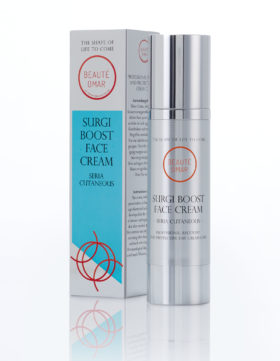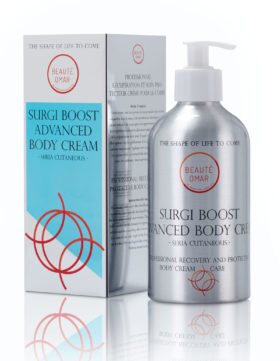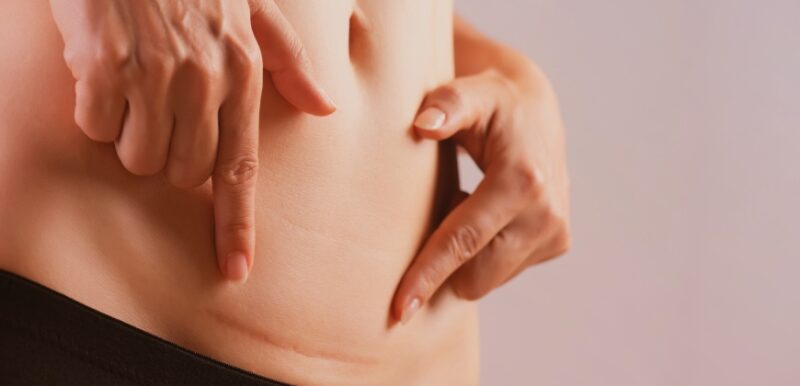The skin is the mirror of our age. Women experience more skin problems during the menopause. The natural processes of skin ageing are behind this. Here you will learn to understand them better. You will also learn how to prevent these changes and how to take good care of your healthy, mature skin.
Factors of skin problems
Over the years, our bodies change and so does our skin. A number of factors play a decisive role in the ageing of our skin.
Extrinsic factors: external influences
The skin is our largest organ and our most important protection against external influences to which it is constantly exposed. These influences are called extrinsic factors. They include, among others:
- Skin care
- Heat & cold
- Environmental influences (e.g. air pollution in large cities)
- UV-A radiation
Tip: Never go out in the sun without sunscreen (at least sun protection factor 30).
Wrinkles due to smoking
We also endanger our skin through our own actions, for example in the form of smoking. Cigarettes as well as air pollution activate metalloproteinases. These are enzymes that destroy the collagen in the subcutis. They contribute to the formation of wrinkles and structural weakness of the skin and aggravate skin problems during menopause.
Intrinsic factors: Intrinsic properties
The intrinsic factors come from the biological ageing of the skin. It is influenced by:
- genetic factors
- ethnicity
- Gender
Fibroblasts, the most important cells of the skin, divide more and more slowly with age. As a result, the production of elastin and collagen decreases. As a result, the connective tissue of the skin loses elasticity and resilience. Wrinkles not only increase, but also become deeper.
How quickly this process progresses depends on intrinsic factors.
Signs of skin aging
Skin ageing processes begin as early as the age of 30. With increasing age, they progress more and more and become visible externally.
The most noticeable changes are:
- Reduced elasticity of the skin
- darker pigmentation, age spots
- pore size
- pronounced fine lines (wrinkles)
- “Sagging” facial skin due to a decrease in the volume of the bones, subcutaneous fatty tissue and musculature
The aging of the skin in the picture
Based on the pictures below, the superficial structural change of the skin appearance is very clearly visible. The mature skin under the microscope shows a clearly thinned subcutaneous layer of collagen and elastin fibres as well as reduced cell division.
Young skin (30-year-old patient) and old skin (90-year-old patient) in macro- and microscopic comparison. The structural changes that occur over the course of 60 years are clearly visible to the naked eye as well as with the microscope.
Skin changes during the menopause
A woman’s menopause begins very differently. There are many causes for this. Hormonal changes are at the root of all of them. A woman can already feel the influence of hormones during menstruation: the complexion becomes drier or more blemished, for example.
Hormones and skin in the menopause
The increasing signs of ageing in the skin come from the decline of the hormones oestrogen, progesterone and testosterone. These chemical messengers are our beauty secret.
The bodyguards of our skin are the oestrogens. They cause moisture to be stored in the skin and collagen formation to remain active. In addition, they influence good blood circulation in the skin and thus also promote hair growth. They ensure (together with the male hormone testosterone) the perfect architecture of the fat cells in the connective tissue.
The corpus luteum hormone progesterone prevents the breakdown of collagen and strengthens the tone of the veins and vessels.
If the hormone balance is upset, skin problems arise during the menopause – hence the name “menopause”.
Signs of bad skin during menopause
If the hormone level slowly drops at around 35 years of age, the deficit becomes noticeable at different speeds.
- Blemished skin can occur during the menopause: Pimples or dark spots, so-called hyperpigmentation, also called age spots. Acne during the menopause is just as undesirable as during puberty.
-
The production of sebum is no longer optimally hormonally regulated. The overproduction leads to oily skin during the menopause.
-
However, the other extreme can also occur: dry skin during the menopause, which is not limited to the facial skin but can also affect the mucous membranes. Dry eyes are not uncommon either.
-
As hormone levels drop, the potential growth factors diminish. There is a decrease in collagen production and cell division. This leads to soft, sagging skin. This is visible, among other things, in the so-called drooping cheeks or drooping eyelids.
The best facial care for menopause: the best ingredients
Menopausal skin care is different from other creams for younger women. Skin care products should contain the following active ingredients:
- Vitamin C ascorbic acid / vitamin E tocopherol
- Panthenol
- Peptides
- Hyaluronic acid
- DMS Skin Sebum
- Nourishing oil
- Retinol
Vitamin C & E as protective shields
Vitamin C (ascorbic acid) and E (tocopherol) are powerful antioxidants that protect the skin from free oxygen radicals. The free radicals occur naturally during metabolic processes in the body. They react with cell membranes or proteins such as collagen. In doing so, they disrupt collagen production and the skin’s balance. The consequences are less cell division and weak connective tissue.
Vitamin E intercepts these radicals and serves as a protective shield. By preserving the lipid layer and moisturising it, it not only protects the skin, but also keeps germs and skin-damaging substances away. At the same time, it regenerates the face. Unlike other substances, it can overcome the skin barrier and penetrate it.
In medicine, vitamin E is applied orally in high doses to patients with skin burns.
Caution. Vitamin C, on the other hand, can cause a burning sensation on freshly treated skin and make it photosensitive when used in high doses.
Surgi Boost Face Cream contains vitamin E as an important element to provide regenerative support for the skin after medical procedures. The cream is pleasant and soothing.
Retinol fights acne during menopause
Retinoids, also called retinol, can be applied in varying doses to intact skin. Studies have shown that they stimulate collagen synthesis. Existing wrinkles become smoother. Retinoids are also very suitable for fighting acne.
Caution! The disadvantage here is a high sensitivity to light and it is not uncommon for reddening of the skin to occur. Above all, retinol should not be applied to fresh wounds or following medically pre-treated skin.
Panthenol activates cell regeneration
Panthenol, also called dexpanthenol, is a provitamin B5. It is extremely well researched and used in many products such as wound and healing ointments. It also promotes mature and beautiful skin during menopause.
On contact with the skin, the provitamin is converted into pantothenic acid. It provides the skin with moisture.
Above all, however, it stimulates the formation of new fibroblasts and keratinocytes. These are responsible for the synthesis of our supporting tissue as well as for the protection of the skin.
For this reason, panthenol should not be missing from any menopausal skin care – be it on the body or the face. In the Surgi Boost Advanced Body Cream and in the Surgi Boost Face Cream, it is an important active ingredient that supports the skin in its regeneration and healing.
Peptides as growth factors
Peptides are the new boosters of a high-quality facial cream for menopause. They are modelled on the growth factors that babies bring with them after birth and are produced synthetically. That is why they are also called bio-placenta. They have a significant influence on the regeneration of the skin and the reactivation of its metabolism. Extensive studies have demonstrated stimulated collagen and elastin production (Source: Placental growth factors, B.V. Rama Sastry, Placental pharmacology, p. 126-150). Therefore, peptides should be present in every high-quality anti-ageing care.
Hyaluronic acid provides moisture
Of course, hyaluronic acid must not be missing. There are two different hyaluronic acids used in skin care: long-chain and short-chain. The short-chain one can pass through the skin barrier and provides intensive moisture in the dermis, the subcutis. The long-chain one forms a smooth protective film on the skin. Surgi Boost Face Cream contains both in pharmaceutical quality.
DMS Skin Sebum for Dry Skin
The DMS structure is an important tool to rebalance the natural skin sebum. It mimics the sebum or lipid layer of the skin and is also ideal for dry skin. The DMS structure replaces the missing protective film and keeps the skin supple. Feelings of tension and itching can be alleviated.
South African Virgin Oil with Anti-Aging Effect
South African Virgin Oil is an ingredient that is not yet widely used, but has been used in baby care for years. It is extracted from the kernel of the fruit of the Ximenia shrub. In addition to a restructuring effect, the oil also has an anti-ageing effect. The cell membrane is stabilised, the skin becomes softer, more supple and more intensively moisturised. The anti-inflammatory effect soothes skin redness and irritation.
Tips for beautiful skin during the menopause
With intensive care and products that are optimally suited to your skin, you can contribute to beautiful skin during the menopause. There are also other tips to help build up your skin.
- Minimally invasive procedures such as microneedling in combination with enriched autologous blood, also called Vampire Lift.
The growth factors of the platelets and the stimulus of the micro-injuries lead to skin renewal from the deep layers. - Sun protection is indispensable for the skin. A sun protection factor of at least SPF 30 protects the skin from harmful UV rays and has a preventive effect against further sun damage.
- Regular visits to the gynaecologist are obligatory to determine the hormone status. This can be the basis for hormone therapy during the menopause. Such therapy is now a recognised medical standard. It has been scientifically proven to have a preventive effect on osteoporosis and cardiovascular diseases. Positive side effect: a beautiful and healthy complexion.
- Drink more water: For a beautiful complexion in the menopause, it is not only a matter of the right skin care. A balanced diet and sufficient fluids also contribute to this. When the body lacks fluids, it first reduces the water in the skin cells. This causes the skin to lose its elasticity.
- Develop a skin care routine and schedule time for yourself: A skin care routine in the evening is just as important as brushing your teeth. Make sure you remove your make-up and cleanse your face. Then apply your skincare. Especially overnight, it can be absorbed intensively and supply your skin with moisture.
- Sleep well: Your skin regenerates primarily while you sleep. That’s why it’s important to get a good night’s sleep during the menopause. My recommendation: Get several silk pillowcases. You should change them weekly. Unlike cotton, silk does not draw too much moisture from your skin.










